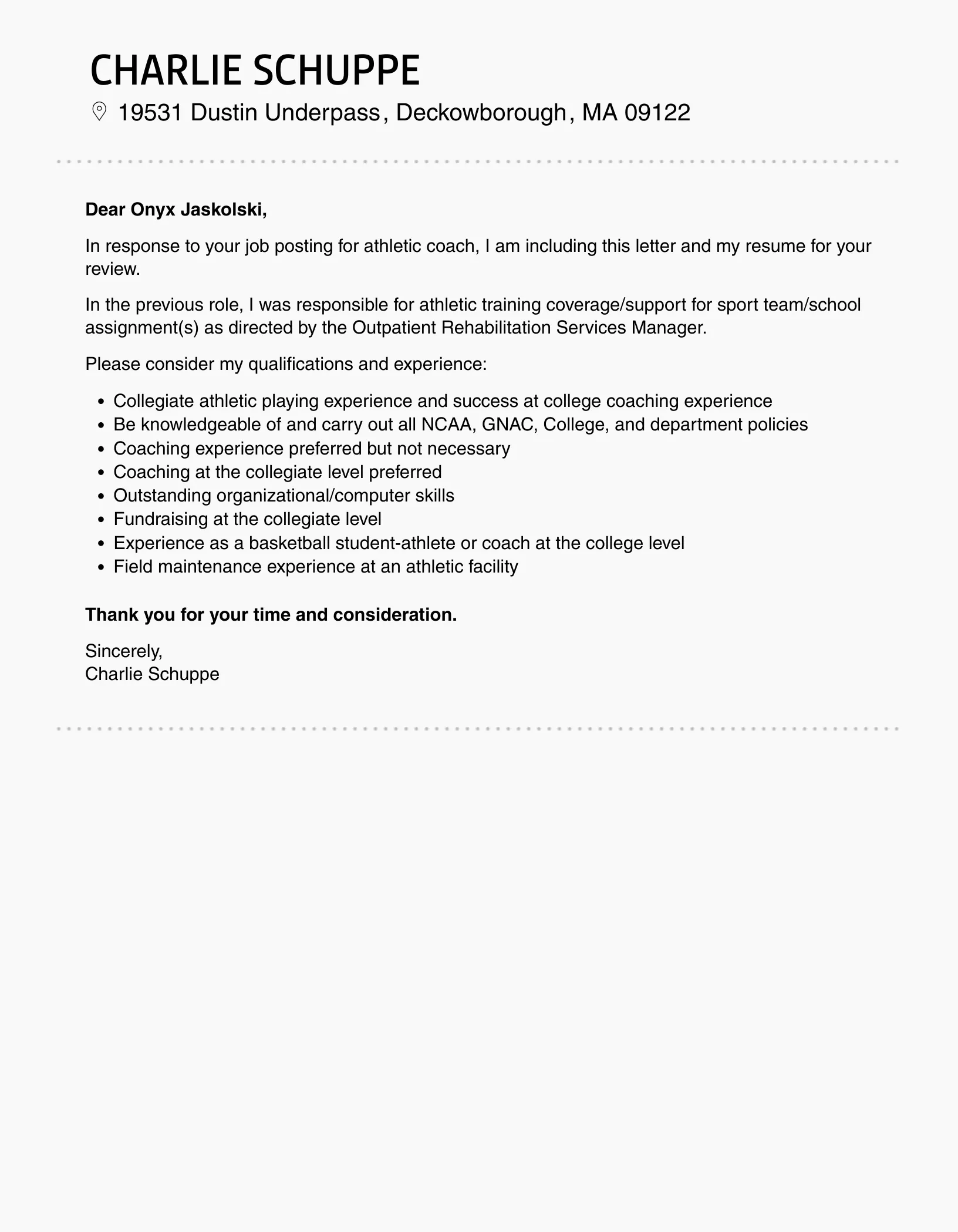Understanding the Athletic Coach Cover Letter
An athletic coach cover letter is more than just a formality it’s your first opportunity to make a positive impression on a hiring committee. It serves as a crucial tool in your job application, providing a personalized introduction and a concise overview of your qualifications and experience. Unlike a resume, which offers a factual summary, the cover letter allows you to communicate your personality, enthusiasm, and specific reasons for your interest in the coaching position. This document should demonstrate your understanding of the school or team’s needs and your commitment to their success. A well-crafted cover letter significantly increases your chances of landing an interview and ultimately securing the coaching position.
Purpose of an Athletic Coach Cover Letter
The primary purpose of an athletic coach cover letter is to persuade the hiring committee that you are the best candidate for the job. It should clearly articulate your coaching philosophy, your understanding of the team’s needs, and your commitment to fostering student-athlete development both on and off the field. A strong cover letter allows you to elaborate on experiences and achievements mentioned in your resume, providing context and demonstrating how your skills align with the specific requirements of the role and the values of the institution. Furthermore, it gives you the chance to express your passion for coaching, your dedication to mentoring young athletes, and your ability to contribute to a positive team environment. A well-written cover letter can highlight your strengths and distinguish you from other applicants.
Key Components to Include in Your Cover Letter
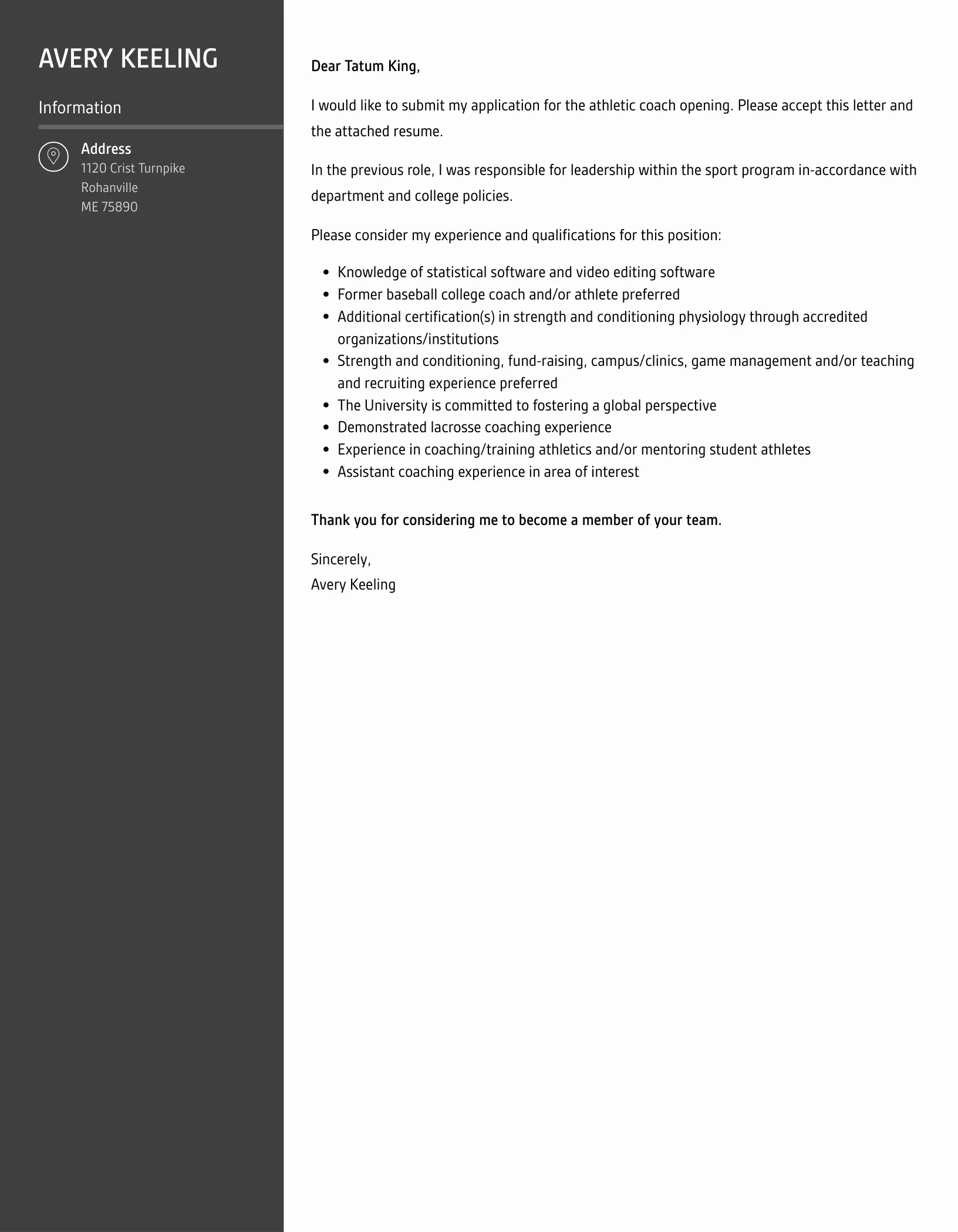
A compelling athletic coach cover letter consists of several key components, each playing a vital role in showcasing your qualifications. These include comprehensive contact information, a captivating introduction, an overview of your coaching skills and experience, a section that highlights your relevant achievements, a demonstration of your passion for athletics and coaching, an acknowledgment of the job’s specific requirements, and a personalized touch that addresses the school or team’s unique needs. These elements should be strategically integrated, creating a cohesive and persuasive narrative that highlights your suitability for the position and motivates the hiring committee to consider you for an interview.
Contact Information
Start with your complete contact information at the top of the cover letter. Include your full name, phone number, professional email address, and optionally, a link to your LinkedIn profile or coaching website. Ensure this information is easily visible and accurate, as it’s the primary means for the hiring committee to reach you. Using a professional email address is essential, and double-check the phone number for accuracy. This section ensures the hiring committee can easily contact you to schedule an interview or request further information.
Introduction: Grab Their Attention
The introduction is your first opportunity to make a strong impression. Start with a brief, engaging statement that grabs the reader’s attention. Mention the specific coaching position you are applying for and where you saw the job posting. Briefly state your enthusiasm for the opportunity and your understanding of the school or team’s mission. Avoid generic opening lines; instead, try to personalize your introduction by referencing something specific about the school or team that appeals to you. You can also briefly mention a key achievement or skill that immediately highlights your suitability for the role. This initial paragraph should set the tone for the rest of the letter, making the reader want to continue reading.
Highlight Your Coaching Skills and Experience
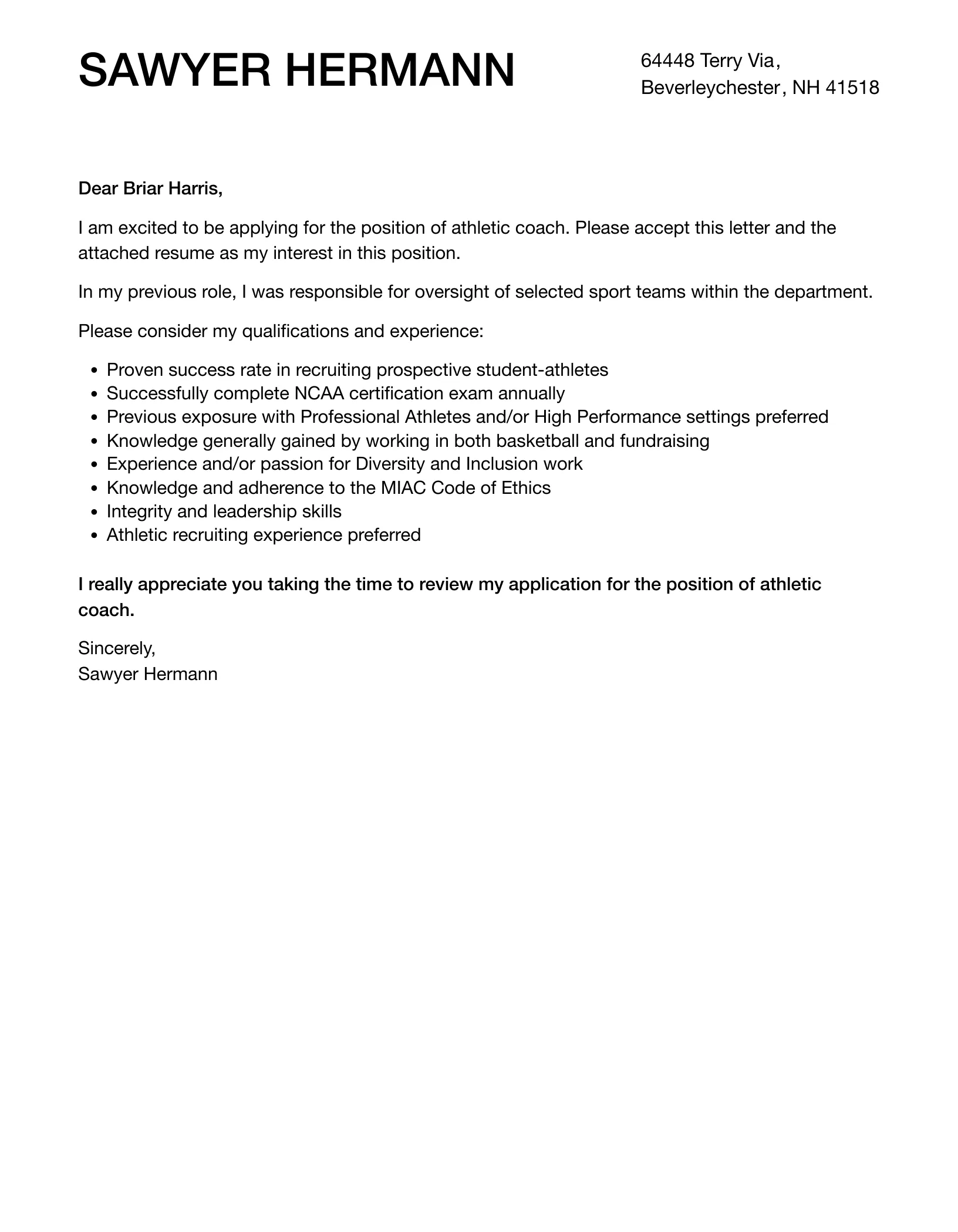
In the main body of your cover letter, provide a detailed overview of your coaching skills and experience. Focus on skills that are directly relevant to the specific coaching position. Mention your experience coaching at various levels, including high school, college, or professional leagues. Detail your expertise in areas such as player development, game strategy, practice planning, and team management. Use specific examples to demonstrate how you have successfully implemented these skills in the past. Be sure to incorporate keywords from the job description to show that you possess the required qualifications. This section should provide a clear picture of your professional capabilities and readiness to take on the role.
Emphasize Relevant Achievements
Quantify your accomplishments with specific examples and data. Instead of simply stating you improved player performance, provide the exact percentage increase in their scoring average, or how many players you helped to receive scholarships. If you led a team to a championship or significantly improved their win-loss record, highlight these achievements. Mention any awards or recognition you or your team have received. Use action verbs to describe your achievements and quantify your impact whenever possible. This section should be a testament to your ability to deliver results, demonstrating your value to the team or school.
Showcase Your Passion for Athletics and Coaching
Express your genuine passion for athletics and coaching. Describe why you are drawn to the sport and what motivates you to work with young athletes. Discuss your coaching philosophy, your commitment to fostering a positive and supportive team environment, and your belief in the importance of sportsmanship and character development. Explain how you inspire and motivate players. Show how you promote teamwork, discipline, and personal growth. Your enthusiasm should shine through, demonstrating your dedication to the role and the impact you aim to make on student-athletes. Convey your enthusiasm for the specific school or team, explaining why you believe it is a good fit for your coaching style and values.
Address Specific Requirements of the Job
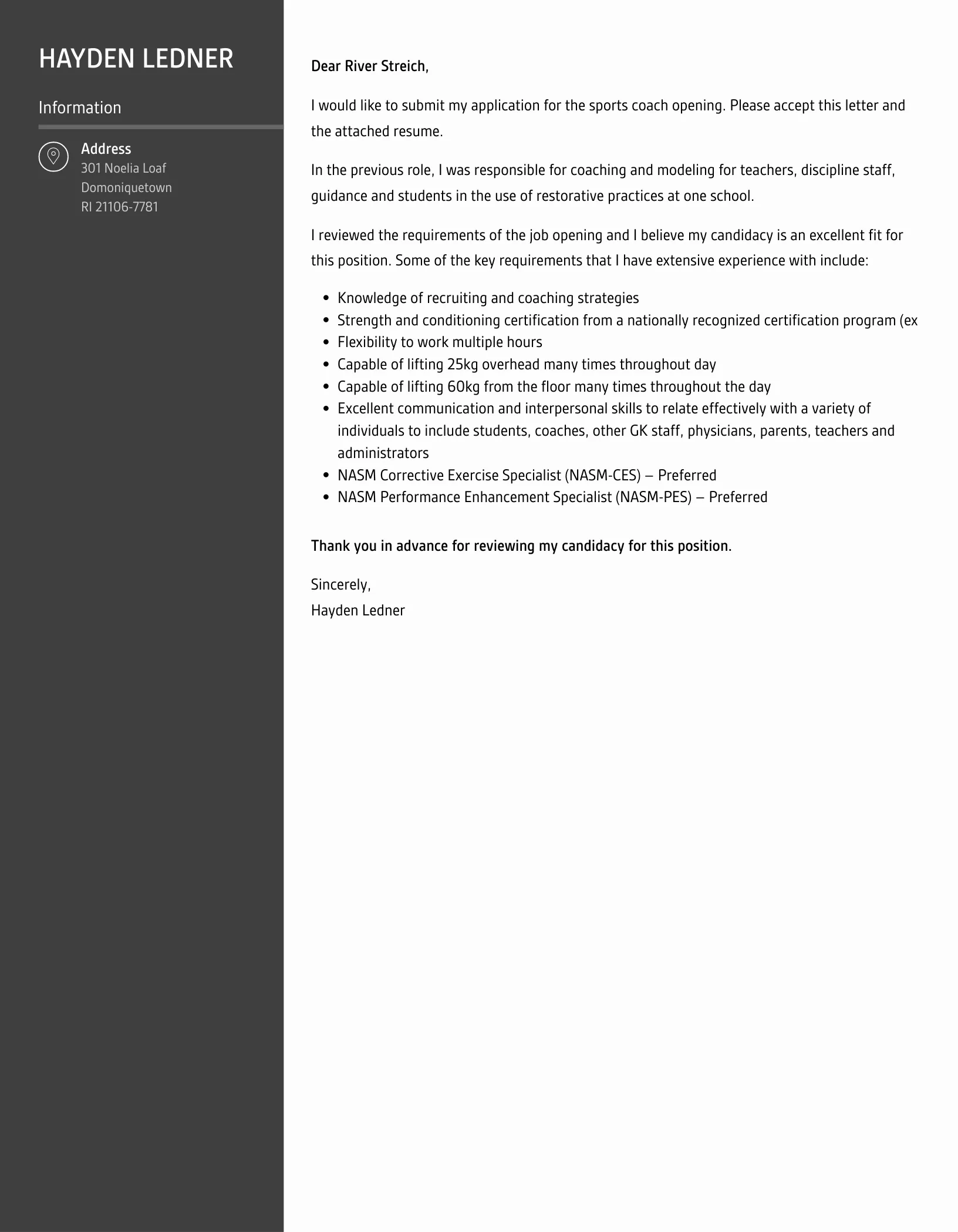
Carefully review the job description and address the specific requirements listed. Mention the skills, certifications, and experience that are explicitly requested. Tailor your cover letter to demonstrate how your qualifications align with the job requirements. If the job description highlights the importance of player development or team leadership, provide examples that illustrate these strengths. Highlighting your ability to handle administrative tasks, such as managing budgets or coordinating travel, can be a significant advantage. Make sure to use the same language and keywords from the job description to make it easy for the hiring committee to recognize your fit for the role.
Tailoring Your Cover Letter to the School or Team
Customizing your cover letter to the specific school or team is crucial for showing that you are genuinely interested in the opportunity. It demonstrates that you’ve done your homework and are committed to understanding their unique needs and values. This personalization sets you apart from generic applicants and shows that you are serious about the role. This section will guide you in researching the school or team and adapting your cover letter to their specific requirements.
Researching the School or Team
Before writing your cover letter, thoroughly research the school or team. Visit their website to learn about their mission, values, and athletic programs. Review the team’s recent performance, including win-loss records and any championships or awards. Familiarize yourself with the coaching staff, school culture, and any specific initiatives or programs they are involved in. Look for news articles, social media posts, or interviews that provide insights into the team’s priorities and challenges. Understanding the school’s academic standards, athletic facilities, and community involvement will also help you tailor your cover letter more effectively. The more you know, the better you can demonstrate your ability to contribute to their success.
Customizing Your Letter to Fit Their Needs
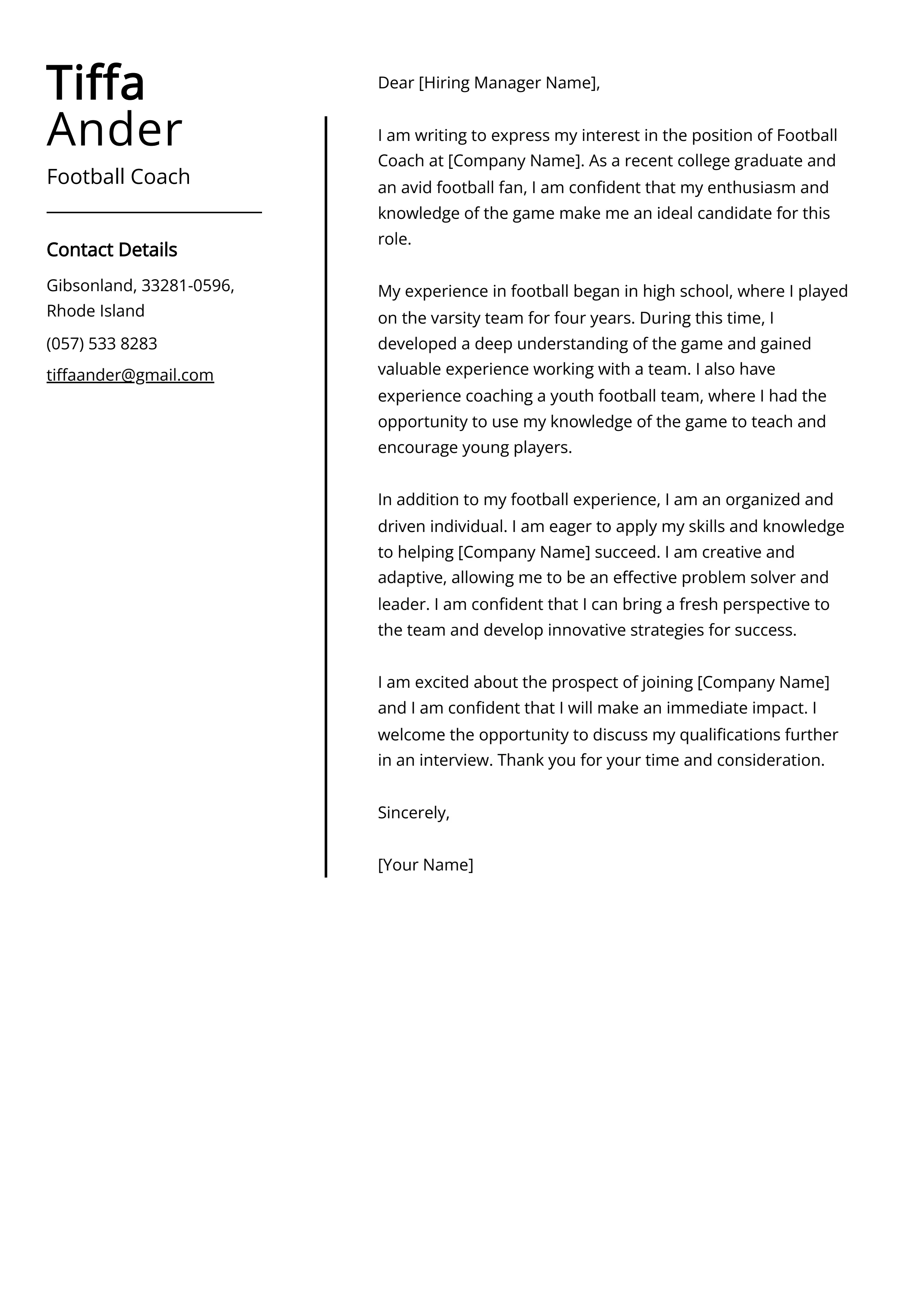
After researching the school or team, customize your cover letter to fit their specific needs. Highlight any experiences or skills that align with their values, mission, and goals. If the school emphasizes academic excellence, mention your ability to support student-athletes’ academic success. If the team is known for its community involvement, share examples of your experience in community outreach. If the team is working on specific challenges, such as improving player development or team morale, address these issues in your letter. Show how your coaching style, experience, and philosophy can help them achieve their objectives. This personalization proves that you are committed to their success.
Formatting Your Cover Letter for Success
The formatting of your athletic coach cover letter is as important as the content. A well-formatted letter is easy to read, professional, and demonstrates attention to detail. Choose a suitable font, maintain a consistent style, and ensure there are no errors. This section will guide you on achieving the correct formatting and help your cover letter stand out.
Choosing the Right Font and Style
Select a professional and easy-to-read font, such as Times New Roman, Arial, or Calibri. Use a font size between 10 and 12 points for the body of your letter and slightly larger for headings. Use consistent formatting throughout the document. Maintain uniform margins (typically one inch on all sides), and double-space between paragraphs to improve readability. Avoid using excessive bolding, italics, or underlining. Keep the design clean, simple, and professional to make a positive impression.
Ensuring a Professional Tone and Language
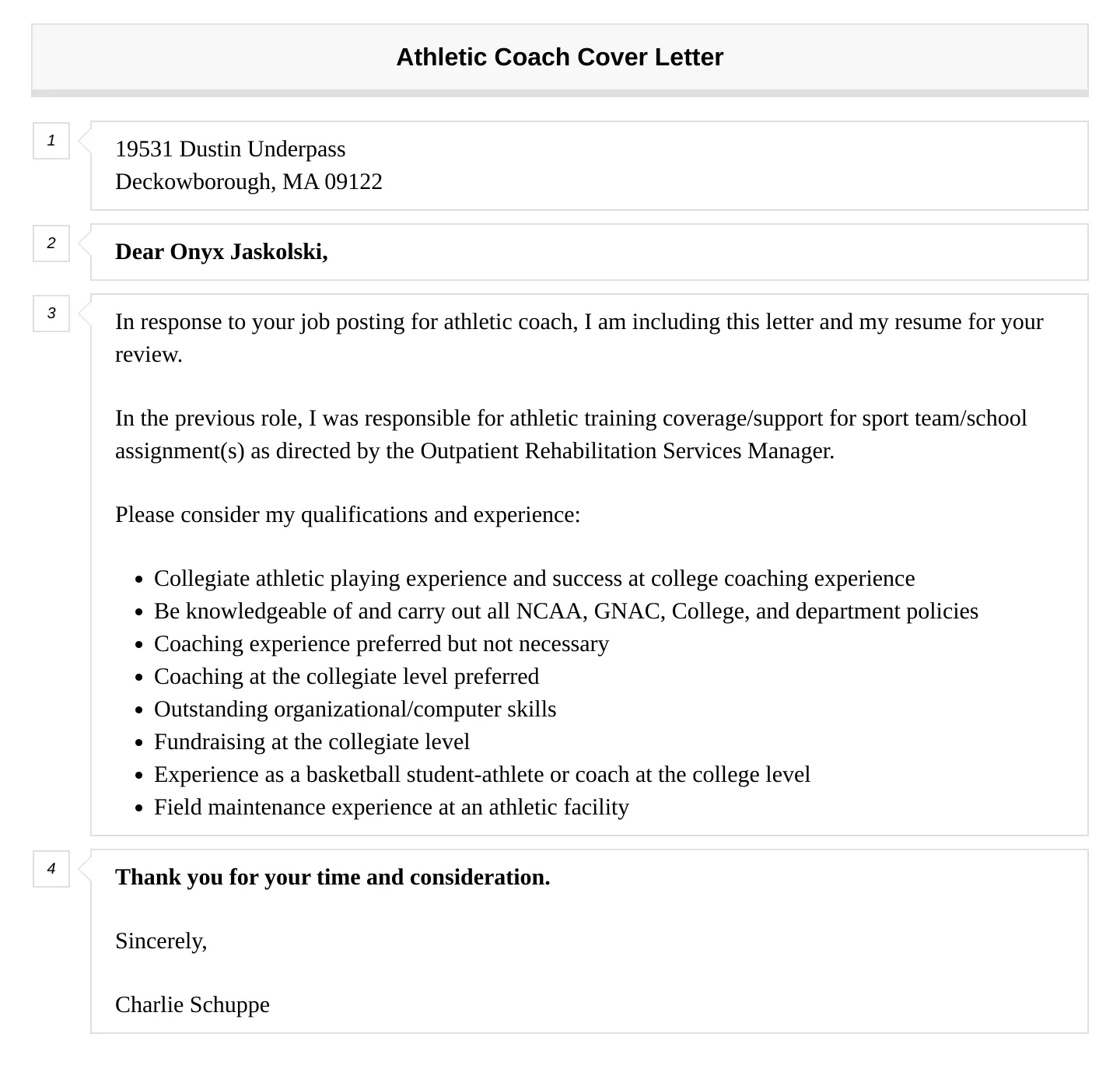
Use a professional and respectful tone throughout your cover letter. Avoid slang, colloquialisms, and overly casual language. Be positive, enthusiastic, and confident, but avoid sounding arrogant or boastful. Proofread your letter carefully for any grammatical errors or typos. Use clear, concise language and avoid jargon that might not be understood by the hiring committee. Use strong action verbs and active voice to demonstrate your capabilities and achievements. Maintaining a professional tone is important to be taken seriously.
Proofreading and Editing Your Cover Letter
Proofreading and editing are essential steps in ensuring your cover letter is polished and professional. Carefully review your cover letter for any errors in grammar, spelling, punctuation, and formatting. Read your letter aloud to catch any awkward phrasing or typos. Use a spell-checker, but don’t rely on it entirely; it may not catch all errors. Ask a trusted friend, colleague, or career advisor to review your cover letter and provide feedback. A fresh pair of eyes can often spot mistakes that you may have missed. Review your cover letter multiple times, making sure it is free of errors and presents you in the best possible light.
Avoiding Common Mistakes
Avoiding common mistakes can significantly improve your cover letter. One of the most frequent errors is a generic, impersonal letter that doesn’t address the specific job or school. Another common mistake is providing excessive detail that is not relevant to the position, or failing to proofread the letter for errors. Additionally, neglecting to follow instructions in the job posting or using a negative tone can significantly reduce your chances. To avoid these issues, carefully tailor your cover letter to each job, proofread diligently, and highlight your relevant skills and accomplishments in a positive and professional manner. Also, ensure to avoid writing too long cover letter and focus on the quality of content.
What to Avoid in Your Cover Letter
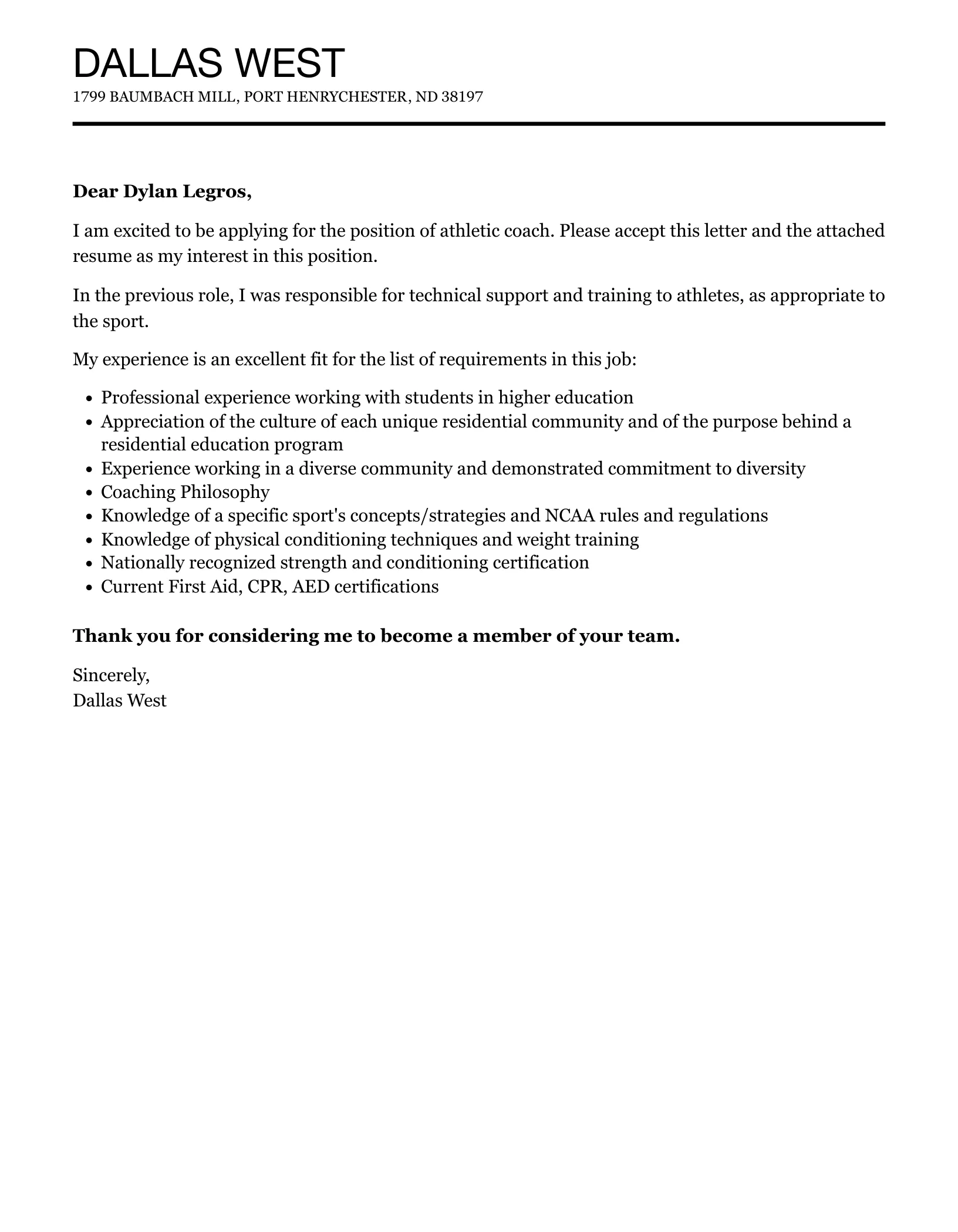
Certain elements can diminish the effectiveness of your cover letter. Avoid using clichés and generic phrases that don’t showcase your unique qualities. Don’t include irrelevant information that doesn’t relate to the coaching position or the school’s values. Steer clear of exaggerating your qualifications or making false claims, as this can lead to serious consequences. Avoid negative language, such as criticizing past employers or dwelling on failures. Do not send the same cover letter for every job, as this indicates a lack of interest and personalization. Being aware of what to avoid helps ensure your cover letter remains professional and compelling.
How to Follow Up After Submitting Your Application
Following up after submitting your application demonstrates your continued interest and professionalism. Sending a thank-you note and re-iterating your interest will boost your chances of getting the job. This section will describe the steps on how to follow up effectively.
Sending a Thank-You Note
Within a week of submitting your application, send a thank-you note to the hiring manager or the person specified in the job posting. Briefly thank them for their time and consideration. Reiterate your interest in the position and briefly mention a key qualification or achievement. Reiterate that you are available for an interview at their earliest convenience. Keep the note concise, professional, and tailored to the specific job and school. A well-crafted thank-you note shows your continued enthusiasm and attention to detail, which can leave a lasting positive impression.
Reviewing and Improving Your Cover Letter
Continuously review and improve your cover letter based on feedback and your experiences. After each application, assess what worked well and what could be improved. If you receive an interview, take note of questions you were asked and how you could have better addressed them in your cover letter. Update your cover letter with new achievements, skills, and experiences as they arise. Seek feedback from career advisors, mentors, or trusted colleagues. Regularly revise and tailor your cover letter to different coaching positions and schools to increase its effectiveness. Continuous improvement ensures your cover letter remains current, relevant, and effective in helping you land your dream coaching job.
